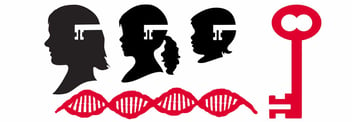DNA… Nurture Your Nature – Session One
- Home
- Blog

The Next Frontier of Wellness
DNA+Environment+Triggers+Chance = Your Future Health and Wellness.
Determine how to “Nurture Your Nature” through “Mindful DNA” Testing– Bruce Alan Kehr, M.D.
GRIK1. ADRA2A. COMT. 5H2C. OPRM1… and more. Reader, we’ve come a long way since the beginning of our “DNA: I Am Who I Am… or Am I?” blog series, which describes each major gene analyzed in the Genecept Assay genetic test. At the beginning of the series, you might have read this list of genes and thought to yourself: This jumble of letters is too science-y for me… I’ll never understand what “GRIK1” means, and plus, what’s it really got to do with me? Believe me, we’ve all been there: staring into the depths of a science-heavy article or headline and feeling like the subject matter is simply way too over our heads. That’s why my goal in this initial DNA series has been simple: To make that seemingly incomprehensible jumble of letters not just understandable, but tangible, and directly relatable to your life—to give you knowledge that empowers you to make thoughtful and well-informed decisions about that which affects every second of your time here on earth: Your mental health. To help you Determine Your Destiny.
If you’ve been following along, you now have a shorthand for that complex language: GRIK1? Oh yeah, that’s the gene that might make me dependent on alcohol. And my ADRA2A variant might be playing a role in my tendency towards distraction. I know a lot of factors determine weight gain and weight loss—but I also know my genes—like 5HT2C—can play a role that I need to be paying attention to. Gene by gene, blog by blog, we’ve shed light on how you can take control of your destiny by coming to know your personal genome: by understanding what you’re working with, whether it’s a predisposition towards opioid addiction or a biological aversion towards traditional antidepressants, you can pinpoint your problem areas and target them using medicines precisely tailored to your body and your brain.
The Genecept Assay and Precision Medicine
Now, those of you who may be jumping into my weekly blog for the very first time, you may be asking: I’ve heard a lot of skepticism about genetic tests—can the Genecept Assay really make a difference in my health? In fact, it does—the Assay isn’t telling you about your ancestry—it’s “actionable.” It’s telling you about what’s happening inside your brain as a result of your personal genome—and how certain medications may help, or hurt. Traditional trial-and-error prescribing results in poorer outcomes, prolonged suffering for patients and their families, and higher rates of side effects and adverse events. The power that DNA testing puts into you and your clinician’s hands is huge—and to prove that out, all you have to do is turn to the numbers. 50% of patients do not respond to first-line medication therapies. 30% remain resistant to treatment following four treatments. Anxiety recurrence is up to 50%. And 75% of patients with schizophrenia discontinue medication within 18 months. The list goes on: ADHD can persist in 65% of adults diagnosed as children. Bipolar disorder has an up to 70% relapse rate. Bottom line: The trial-and-error process of prescribing medication is expensive, time consuming, and can even be life-threatening. Patients who participate in a simple cheek swab save themselves the months- and even years-long process of trying to find real help for their afflictions. In 93% of patient cases, clinicians who had a genetic test like Genomind’s Genecept Assay were influenced by the results and made changes to meds. This is precision medicine at its best.
From Genecept to Mindful DNA: Two Tests, Two Solutions
We’ve reached the conclusion of the Genecept Assay analysis—we’ve covered every gene in-depth. But we are far from finished in our overall exploration of the role genes play in our mental health and wellbeing. This summer, we’re going to be exploring a new genetic test—this one geared less toward finding prescription solutions fast, and more toward long-term non-prescription tools you can implement right now to help you achieve “Healthspan”—living as healthily as possible for as long as possible. The test is called Mindful DNA: and reader, it’s a goldmine of information.
The goal of the Genecept Assay is to find medication that will work for you to rapidly improve your mental health. The Assay is used to guide treatment for a range of psychiatric conditions, including depression, anxiety, obsessive compulsive disorder, ADHD, PTSD, autism, schizophrenia, chronic pain, substance abuse, bipolar disorder, and many more. And while medication plays an important role in protecting our mental health—and in many cases is in fact necessary to tweak our brain functioning, Mindful DNA focuses on a different outcome: actionable DNA testing to promote health and wellness, to enable you to feel better in the near future, and achieve a greater healthspan. This test prioritizes the power of epigenetics—our ability to change our gene expression through habits and activities—to create a lasting positive effect in our overall wellbeing. Those habits and activities may include targeted, genome-based dietary changes, exercise or meditation, vitamins and supplements, and even sunlight.
Mindful DNA’s test results categorize 32 genes into three categories related to the probability of developing certain diseases: “vulnerable”, “average”, or “resilient.” From there, the goal is simple: find non-prescription interventions that slowly but steadily alter the disease-inducing expression of our very own genome, over months or years. These interventions have the power to help transform a “vulnerable” gene’s effects to an average one’s—and an average gene’s effects to resilient. Have you ever wondered what you could be doing to live well into your nineties while still being mentally present while possessing a health body as well? Mindful DNA is the test that gets you there.
Introducing, DNA… Nurture Your Nature™… and Systems Biology
Let’s try a brief exercise together. Pause your reading, and for the next 30 seconds close your eyes and become aware of how you are feeling, and where your feelings are coming from, including all of your physical sensations… then open your eyes.
What did you experience? Chances are you had feelings and sensations originating in your heart, gut, muscles, joints, and of course your brain (thoughts of loved ones, problems, anticipation, pleasure, and so forth creating many feelings). The lesson here is that HOW WE FEEL ORIGINATES IN, AND IS AFFECTED BY, VIRTUALLY EVERY ORGAN AND SYSTEM IN OUR BODY!
Given this astonishing fact, today we will launch a new focus on non-prescription ”epigenetic modifiers” to your genetic code through a new series: Welcome, reader, to “DNA… Nurture Your Nature.” Mindful DNA breaks down a whopping 32 genes into six key areas, or domains, of health: cognition and mental activity, cardiometabolic, GI and immunity, stress and emotional wellbeing, inflammation, and sleep. For example, we’ll dig into genes that may be increasing your body’s inflammation, wreaking havoc on every organ and system inside you, and we’ll discuss practical solutions to adopt to correct this gene expression. Other genes may increase your risk of cardiovascular disease—and we’ll discuss solutions there, too. If you’re wondering how inflammation and cardiovascular illness impact your mental health, I have an easy answer for you: It’s because each of those six domains are widely interconnected—sometimes in surprising ways. The approach that defines these interconnections is known as Systems Biology, whereby health, vulnerabilities, or illness in one system affects all of the other systems. What we feel in our bodies, and the wellness vs. illness in one or more body-systems, can have a major impact on our mental health, and by pinpointing the problem,we can begin to make adjustments. Each of these six domains interact with one another, and we’ll dive into how they overlap and how to heal them as we go along.
Next week, we’ll dive a bit more into Mindful DNA, but this week, I want to leave you with one more thought: You have much more power to change the expression of your DNA (for good or for ill) than you may think. The more you understand the processes of your own body, the more opportunity you’ll have to shape your future the way you want it to be. The world around you may feel unstable and confusing, yet by teaching you how to take control of your mind and body, we’ll help put you in the driver’s seat and and provide a roadmap for greater health and wellness.
Related Information
- Learn about Genetic Testing
- Learn about Potomac Psychiatry
- Meet Our Doctors
- Contact Potomac Psychiatry
.png?width=144&height=144&name=Untitled%20design%20(34).png)



